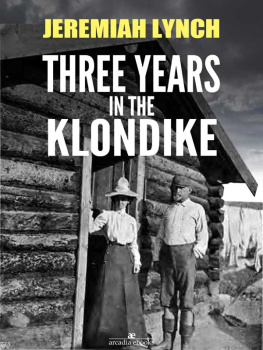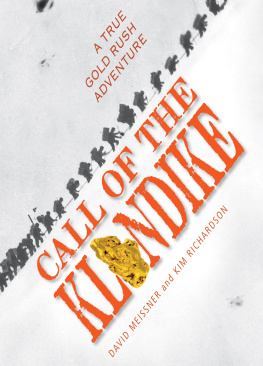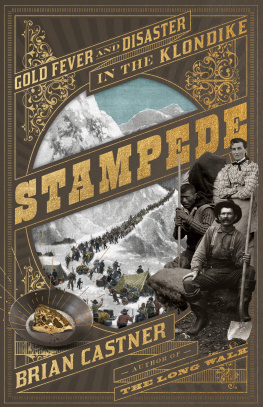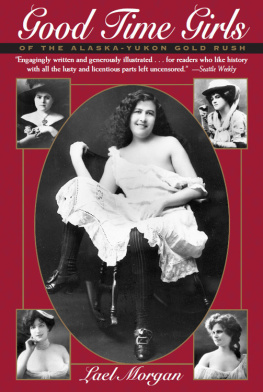CHAPTER I
FRISCO TO DAWSON
ON JUNE 11, 1898, THE new steamship St. Paul left San Francisco for St. Michaels with 275 passengers, bound for the Klondike vi the mouth of the Yukon River. A faint rumour of the misfortunes that had occurred to many of those who essayed the Chilkoot Pass the previous winter already pervaded the city, and partially induced others, as well as myself, to choose the longer but safer water route.
In a week we came to Dutch Harbour, in the Aleutian Islands, where the St. Paul anchored three days to coal. Other steamers and sailing-vessels were there and at Unalaska, three miles distant, all laden with passengers for the Klondike. Three thousand people, including scores of women, were of the number; we made a strangely assorted assemblage with our motley costumes. A shipload from Boston, which had arrived six weeks earlier, was camped on the shore, waiting for the ice to break in the Behring Sea, and also for a steamer that had been chartered to carry them to St. Michaels.
These adventurers were mainly from the New England and Middle States. They were ill-prepared to live in tents, and suffered cruelly in the cold mist, which was never absent. The steamer owners or charterers had contracted to land them at St. Michaels, but had disembarked them at Unalaska instead, and then sent the vessel back to Seattle for additional supplies. No provision had been made for this exigency, and many lacked shelter, clothing, food, and money. It may be thought that people, especially women, should not have ventured on such an expedition without some means. But if we all had wealth there would be no more enterprise, and the world would be stagnant.
Several river steamboats for the Yukon were in process of building at the island. They were constructed to draw but 4 feet of water, fully equipped and loaded, with ample space for 150 passengers and 200 tons freight. When completed they would be towed to St. Michaels, it being deemed hardly safe for such shallow craft to traverse the thousand miles of sea with their own steam.
I wandered in the bleak, muggy atmosphere for the three miles separating Unalaska and Dutch Harbour, and over the soggy ground covered with tents and filled with anxious, worried faces. No sun was visible; it was rain, snow, or mist, or all three combined; not a cheerful halting-point on the way to wealth. The land directly back from the shores was barren, desolate, and mountainous, with neither trees nor shrubbery.
A small Russian church, two or three trading stores, log huts and tents for employes of the ship agencies and for the artisans imported to build the boatsno more. It gave us all the blues; for if this was the land and climate at Unalaska, how much worse must it not be a thousand miles still farther into the frozen North?
I looked over our 3,000 very carefully, for it was my interest to know the manner of people who were to be both my rivals and companions in exploiting the new land of gold. None seemed very rich, few very poor. There were neither capitalists nor paupers. None were very old, none were very young. Perhaps two-thirds were from the United States, largely from the Pacific coast. Of the remaining third a goodly proportion were Swedes. Those who are born in cold climes preferably seek the same in other lands; and the reverse seems to be true. For there were very few Italians, Mexicans, or Spaniards, and a scant number of French; and the same rule I found to hold afterwards during my sojourn in the Klondike, with the exception, of course, of the French-Canadians, the Canayens, who are the voyageurs of all this Northern world of ice and snow.
Of the 3,000, very few were in ill health, and if they were poor in everything else, they were rich in good constitutions and robust frames. Even the women seemed to expect all kinds of physical difficulties up north, and were stoically prepaid. But withal I gleaned in conversations that not many of the men had ever lived or laboured in a mining country, and while possessing fortitude were yet very ignorant, both of what had to be done and if they could do it. The sombre weather was typical of their mood. Though many had been here for weeks, I never knew of but one small social entertainment. No music, no dances, no walks or little dinners. All were thinking either of what was before or what had been left behind, and all were fearful, yet anxious, to go ahead, to push on, without delay, to the goal.
They were a picked body of Argonauts, chosen from the entire world, and capable of wresting the gold, and with it a new continent, from the clutches of the frozen North, where both have lain unfound and unexplored since the beginning.
We left Dutch Harbour on June 23, and in two days were slowly steaming amid the ice-floes of the Behring Sea. From the topmast nothing but ice and water could be seen; yet withal it was so shallow that the boatswain kept constantly dropping the lead.
Forty miles from shore in the Behring Sea, and only 10 feet of water under our prow! This is caused by the Yukon River bringing down in its spring freshets trees, earth, and brush, in vast quantities, that lodge on the shallow eastern shores of the sea. For hundreds of miles along the eastern littoral of the Alaskan coast-line this extraordinary phenomenon exists, and eventually the Arctic Ocean will be an inland sea, and people will walk from North America to Asia dry-shod.
Behring Sea is more a strait than a sea, and no strong current nor strong tides exist to move this immense mass of dbris delivered from the mouths of the Yukon River. It therefore lies passive and sluggish, slipping farther and farther into the narrow channel separating Siberia from that part of Alaska adjoining the Yukon. The result is certain, though distant. For the same reason the ocean steamers pass the several navigable mouths of the Yukon at such a distance that these are invisible from the mast-head, and, continuing further north in the narrow channel round by the north-east, anchor in the harbour of the island of St. Michaels, sixty miles above the mouth of the Yukon River. We made slow progress, slipping by and between ice-floes, on which a stray seal could at times be seen, plunging into the water as we neared his trysting-place.
There was no wind, and apparently less current. The floes were not large, and were constantly breaking into smaller pieces under the influence of a warmer latitude, for they had come from the Arctic Ocean. The next morning when we came on deck we found ourselves in the Bay of St. Michaels, and counted twenty-two deep-sea sailing vessels and steamships at anchor. All these had arrived before us, and each one had brought passengers and supplies for the Klondike, which was 1,600 miles distant up the Yukon.
We had our first sample of the Alaskan mosquito, and he sustained his wide reputation. He was voracious and pertinacious. He easily penetrated an ordinary kid glove, and was of abnormal size. He came in uncounted clouds, and the new-comers were his especial favourites. Nothing could prevent his attacks, and we found that the safest place was on the St. Paul, anchored half a mile from shore. Few only even of the most bloodthirsty dared that wide stretch of water, to meet a quick and sudden demise.
The island had but one poor hotel, and no town at all; only a few dwelling-houses and warehouses belonging to the trading companies, and tents for a company of United States soldiers, who were camping with the mosquitoes. Innumerable dogs, guarded by a few squalid Indians, gave life and spirit to the place. Of course there were ourselves5,000 or 6,000 of usbut nearly all living on our respective vessels, for the steamer companies on the outside had sold passenger tickets direct to Dawson, allowing for all detentions. Thus we remained twelve days at St. Michaels on the





